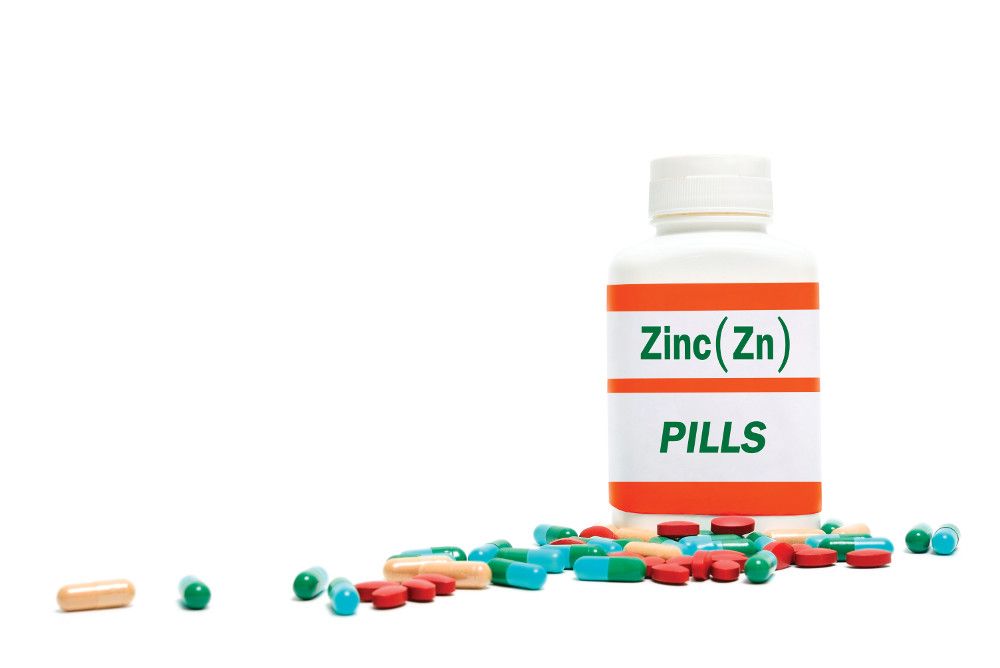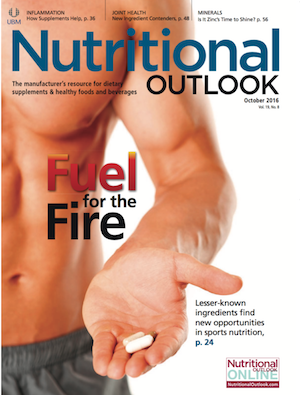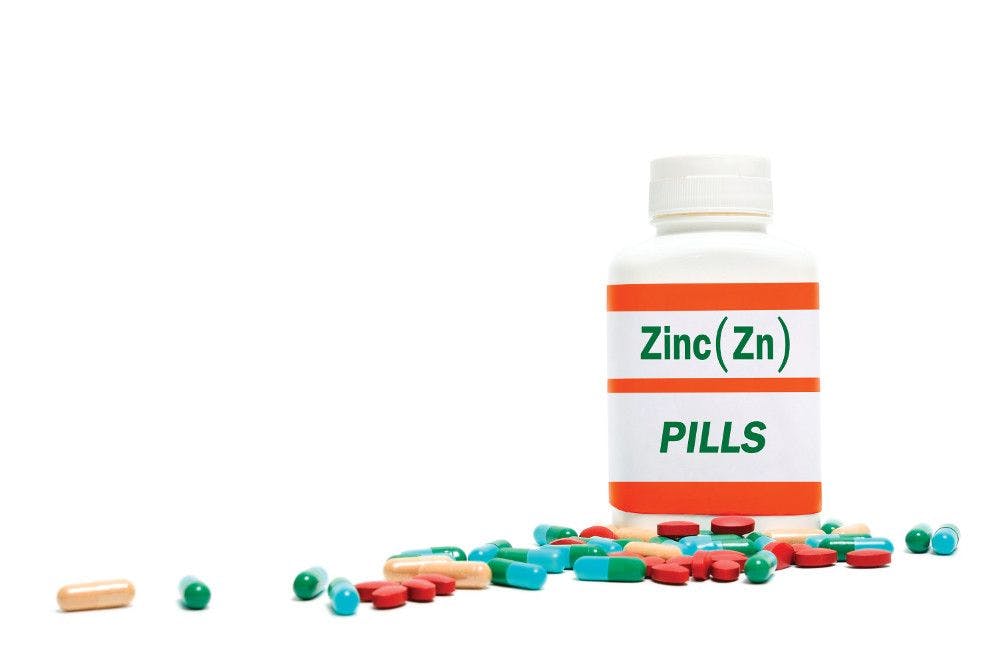Is Zinc’s Day Finally Here?
Superstar minerals often overshadow zinc, but here’s why you shouldn’t underestimate this crucial nutrient.
Photo © Danleap/Shutterstock.com

Zinc often plays second fiddle to better-known minerals like calcium and magnesium, but in terms of its importance to the human body, it is second to none. Just consider what zinc does.
Zinc catalyzes more than 300 enzymatic reactions in the body. It also plays a significant structural role by supporting the integrity of the genome. In fact, estimates suggest that over 2,500 transcription factors, or nearly 8% of the human genome, require zinc for their structural integrity. Additionally, zinc is a significant regulator, influencing the expression of thousands of genes while taking part in numerous cell-signaling pathways.1
Because zinc is such an important part of human biochemistry, any deficiency in zinc can have dire consequences, including stunted growth and development, immune dysfunction, and metabolic imbalances. We’ve seen the consequences of zinc deficiency in underdeveloped countries where food is scarce and socioeconomic status is low. In 2004, zinc deficiency in these populations was linked to over 450,000 deaths in children under the age of five.2
But even marginal or subclinical levels of zinc can be detrimental, as seen in populations that require increased zinc stores, such as pregnant woman and growing adolescents.3 Finally, several chronic health conditions may exacerbate the need for zinc, including bowel diseases, liver and kidney diseases, and diabetes.1
Despite the importance of zinc, the prevalence of zinc inadequacy worldwide exceeds a whopping 17% of the population4. What’s perhaps even more surprising is the level of zinc deficiency in developed countries. In the United States, 35%–45% of adults aged 60 and older have zinc intakes below the recommended dietary allowance (RDA).5
Why aren’t we getting enough zinc in the diet alone? It’s simple. The foods we eat today are relatively low in zinc (as well as other vitamins and minerals). This makes zinc deficiency a public health issue. From a dietary perspective, we need to place more emphasis on eating nutrition-rich foods. Failing that, we can also turn to dietary supplements to help fill in nutritional gaps.
There is some good news, however: more consumers are interested in supplementing with zinc these days. According to recent SPINS data, U.S. sales of zinc supplements (in which zinc was the primary ingredient) grew 20% between July 2015 and July 2016, from $18 million to $21.6 million. Nearly half of those sales ($10.3 million) came from the immune-health market. In fact, within the cold and flu category, sales of products with zinc as a primary ingredient grew 8% between July 2015 and July 2016.
Zinc sales are also growing across delivery systems. According to SPINS, sales of zinc caplets grew the most during that time frame, followed by capsules, soft gels, liquids, tablets, and lozenges, respectively, with only chewables showing a decline.
Why is the importance of zinc now resonating more strongly with dietary supplement users? Perhaps those users have been following the promising research on zinc, not only for immune health but for other important aspects such as metabolic health, growth, and development. Here are just a few recent studies driving home the necessity of this crucial mineral.
Immune Health
Immune health is the health condition most often linked with zinc. Researchers continue to investigate the association between zinc status and immune wellness. More studies are finding that zinc in fact has a tremendous influence on all areas of the immune system.
Immune cells by nature are constantly renewed and reproduced. The two major arms of the immune system are the innate immune response and the adaptive immune response.
The innate response acts as a first line of defense involving polymorphonuclear leukocytes, macrophages, and natural killer cells. Zinc’s major role in this area is to support cell proliferation. Zinc shores up the function of all of these cells. Conversely, a zinc deficiency reduces these cells’ ability to function.6
T cells form the core of the adaptive immune response. Zinc supports both the production and function of T cells and the overall balance of T cell subsets, helping to modulate the adaptive immune response.6
Furthermore, inadequate zinc supply leads to inflammation due to alterations in the production of pro-inflammatory and anti-inflammatory cytokines.6 For all these reasons, zinc has a substantial impact on the body’s immune defenses.
In a current review paper, Martina Maywald and Lothar Rink of RWTH Aachen University Hospital (Aachen, Germany) argue that elderly populations need to supplement with zinc to support their immune health.7 Marginal zinc deficiency is common in this population. The researchers stress that even a marginal deficiency results in substantial dysregulation in adaptive immune function in seniors, leading to an increased production of pro-inflammatory cytokines and disturbances in the balance between cell-mediated and humoral immunity. Supplementing with oral zinc can help normalize zinc levels and restore important functions of the immune system in elderly individuals, the researchers say.
In a recent study on zinc supplementation in seniors, 58% of nursing home residents tested were found to have low serum zinc concentration (<70 mcg/dl).8 Led by Junaidah Barnett and colleagues from the Jean Mayer USDA Human Nutrition Research Center on Aging at Tufts University (Boston, MA), the researchers then performed a double-blind, placebo-controlled trial to explore the immune-health benefits of supplementing with 30 mg of zinc per day for three months. Subjects supplementing with zinc were found to have significantly enhanced T-cell function thanks to an increase in T-cell proliferation, all in support of better overall immune function.
What’s more, in yet another recent study on zinc and immune function, Thai researchers from Chulalongkorn University (Bangkok) assessed the benefits of supplementing with 30 mg of zinc daily for eight weeks in individuals with type 2 diabetes and metabolic syndrome.9 Because this patient population is considered immune-suppressed and at higher risk of developing infections and cancer, researchers were impressed to find that daily zinc supplementation led to improved function of monocytes (white blood cells crucial to the immune response).
Metabolic Health and Diabetes
One indicator that zinc is important to metabolic health is the fact that the pancreas contains the body’s second-highest store of zinc, after the prostate. Recent research on zinc’s role in metabolic health has revealed some novel findings, including the fact that zinc plays an important part in supporting the function of insulin.
Zinc is involved in a number of functions related to insulin. It performs as an insulin “mimetic” (mirroring the role of insulin), helping to support signal transduction via insulin receptors, influencing insulin storage and secretion, and directing insulin distribution in tissues and organelles. Zinc also supports insulin-mediated glucose transport in muscle, fat, and liver tissue, thus influencing glycemic control.10
In order to explore zinc status in individuals with diabetes, Judith Jansen and colleagues from RWTH Aachen University recruited 75 individuals with either type 1 or type 2 diabetes. The researchers then matched the subjects (by sex and age) with 75 non-diabetic individuals who served as controls.11 After measuring subjects’ serum zinc levels, researchers found that diabetics were significantly zinc deficient. Similar trends were found in intracellular zinc concentrations compared to controls.
A more recent trial led by Fatemeh Foroozanfard of Kashan University of Medical Sciences (Kashan, Iran) evaluated the effect of zinc supplementation on metabolic markers in women with polycystic ovarian syndrome (PCOS).12 In the eight-week randomized, double-blind, placebo-controlled study, 52 women aged 18–40 with PCOS supplemented with 220 mg of zinc sulfate (50 mg elemental zinc) or a placebo daily. Blood tests were performed at baseline and after eight weeks to assess changes in blood sugar control, insulin, and lipid concentrations.
Subjects taking zinc had significantly reduced fasting plasma glucose and serum insulin levels compared to the placebo group; the placebo group displayed slight increases in both parameters. In addition, markers of insulin resistance, serum triglycerides, and very-low-density lipoprotein (VLDL) cholesterol were all significantly lower in zinc-treated women. Assessment of pancreatic beta-cell function also revealed significant improvements versus placebo, indicating the potential benefits of zinc supplementation for supporting metabolic parameters related to blood sugar management.
The results of these and other studies suggest that zinc is not only essential for metabolic health and function, but that, pending the results of further research, supplementing with this mineral may have significant therapeutic benefits for impaired blood sugar control.
Growth and Development
Zinc is also an essential nutrient for growth and development. Research indicates that inadequate zinc status increases the risk of pregnancy complications. Unfortunately, pregnant women generally do not get enough zinc.
Even mild zinc depletion in expecting mothers has been associated with growth retardation in the uterus. Furthermore, zinc is essential for bone growth and development. It interacts with several hormones involved in bone metabolism. In bone tissue, zinc concentrations are quite high compared to zinc stores in several other tissues, making it an essential component of bone matrix. Zinc has also been found to enhance the effects of vitamin D on bone health by enhancing the stimulation of DNA synthesis in bone cells.13
Several recent investigations reveal the beneficial effects of zinc on various aspects of growth and development. In a recent double-blind, randomized controlled trial, Samia Nossier and colleagues from Alexandria University (Alexandria, Egypt) investigated the impact of zinc supplementation in healthy pregnant women with low serum levels of zinc.14 In the trial, 675 pregnant women aged 20-45 were randomized into one of three supplementation groups: 1) supplementation with 30 mg of zinc (as zinc sulfate), 2) supplementation with 30 mg of zinc plus vitamins, or 3) supplementation with a lactose placebo. Subjects supplemented daily, from the time of study recruitment to one week post-delivery (the follow-up period).
The zinc supplements in both zinc groups were equally effective, and superior to placebo in reducing second- and third-trimester complications as well as the occurrence of stillbirth and preterm delivery. The occurrence of neonatal infections also significantly decreased with zinc supplementation, supporting the benefits of zinc supplementation for both mother and developing fetus.
An interesting study led by Paige Berger from the University of Georgia (Athens, Georgia) assessed the potential usefulness of zinc for bone development in adolescent girls.15 Adolescence is a time of rapid growth and, as such, the authors sought to determine the impact of zinc on markers of bone turnover in 147 girls aged 9–11.
The girls were randomized to supplement with zinc (9 mg/day) or a placebo for four weeks. At the end of the study, zinc supplementation, compared to placebo, significantly enhanced serum levels of an important marker of bone turnover known as procollagen type 1 amino-terminal propeptide (P1NP). The increase in this marker indicates zinc’s ability to enhance bone formation in young, adolescent girls and suggests that zinc plays a crucial part in improving childhood bone strength.
Another recent study, published in August 2016, looked at zinc’s effects on growth. Conducted by Sanguansak Rerksuppaphol and colleagues from the Department of Pediatrics at Srinakharinwirot University (Nakorn Nayok, Thailand), the study evaluated the benefits of zinc supplementation, along with a multivitamin, in children.16
In the randomized, controlled trial, 140 children aged 4–13 were asked to supplement with either a placebo or with 20 mg of zinc (as zinc bisglycinate) plus a multivitamin. Subjects took these protocols five days per week for six months.
The primary endpoint of the study was to assess a change in height. In the groups supplementing with zinc, subjects grew significantly more compared to the placebo group (a mean gain of 4.9 cm versus a mean gain of 3.6 cm, respectively), indicating the positive effect of zinc in combination with multivitamins in growing children.
Zinc’s Time to Shine?
As a mineral intimately involved in so many biological processes, from birth onwards, zinc is an indispensable nutrient for life. Given that such a large swath of the global population is at risk for stark zinc deficiency, and that several populations such as seniors, pregnant women, and children have a greater need for this essential mineral, it’s important to ensure a sufficient intake of zinc through diet and supplementation. The wide-ranging roles zinc plays in areas as diverse as immune health, growth and development, and numerous metabolic functions make zinc a critical nutrient for achieving optimal health throughout the human lifespan.
Also read:
2016 Ingredient Trends to Watch for Food, Drinks, and Dietary Supplements: Zinc
Bone-Health Cofactors: New Science on Vitamin D, K2, Magnesium, and Zinc
Top Mineral Studies in 2015 for Dietary Supplements
References:
- King JC et al., “Biomarkers of Nutrition for Development (BOND)-Zinc review,” The Journal of Nutrition. Published online March 9, 2016.
- Fischer W et al., “Global and regional child mortality and burden of disease attributable to zinc deficiency,” European Journal of Clinical Nutrition, vol. 63, no. 5 (May 2009): 591–597
- Nakamura T et al., “Mild to moderate zinc deficiency in short children: effect of zinc supplementation on linear growth velocity,” The Journal of Pediatrics, vol. 123, no. 1 (July 1993): 65–69
- Wessells KR et al., “Estimating the global prevalence of zinc deficiency: results based on zinc availability in national food supplies and the prevalence of stunting,” PLoS One, vol. 7, no. 11. Published online November 29, 2012.
- Office of Dietary Supplements - Zinc. Available at: https://ods.od.nih.gov/factsheets/Zinc-HealthProfessional/. Accessed September 3, 2016.
- Bonaventura P et al., “Zinc and its role in immunity and inflammation,” Autoimmunity Reviews, vol. 14, no. 4 (April 2015): 277–285
- Maywald M et al., “Zinc homeostasis and immunosenescence,” Journal of Trace Elements in Medicine and Biology: Organ of the Society for Minerals and Trace Elements (GMS), vol. 29 (January 2015): 24–30
- Barnett JB et al., “Effect of zinc supplementation on serum zinc concentration and T cell proliferation in nursing home elderly: a randomized, double-blind, placebo-controlled trial,” The American Journal of Clinical Nutrition, vol. 103, no. 3 (March 2016): 942–951
- Meksawan K et al., “Zinc supplementation improves anticancer activity of monocytes in type-2 diabetic patients with metabolic syndrome,” Anticancer Research, vol. 34, no. 1 (January 2014): 295–299
- Myers SA et al., “Zinc transporters and zinc signaling: new insights into their role in type 2 diabetes,” International Journal of Endocrinology. Published online April 23, 2015.
- Jansen J et al. “Disturbed zinc homeostasis in diabetic patients by in vitro and in vivo analysis of insulinomimetic activity of zinc,” The Journal of Nutritional Biochemistry, vol. 23, no. 11 (November 2012): 1458–1466
- Foroozanfard F et al., “Effects of zinc supplementation on markers of insulin resistance and lipid profiles in women with polycystic ovary syndrome: a randomized, double-blind, placebo-controlled trial,” Experimental and Clinical Endocrinology and Diabetes, vol. 123, no. 4 (April 2015): 215–220
- Salgueiro MJ et al., “The role of zinc in the growth and development of children,” Nutrition, vol. 18, no. 6 (June 2002): 510–519
- Nossier SA et al., “The effect of zinc supplementation on pregnancy outcomes: a double-blind, randomised controlled trial, Egypt,” The British Journal of Nutrition, vol. 114, no. 2 (July 2015): 274–285
- Berger PK et al., “Zinc supplementation increases procollagen type 1 amino-terminal propeptide in premenarcheal girls: a randomized controlled trial,” The Journal of Nutrition, vol. 145, no. 12 (December 2015): 2699–2704
- Rerksuppaphol S et al., “Effect of zinc plus multivitamin supplementation on growth in school children,” Pediatrics International: Official Journal of the Japan Pediatric Society. Published online April 15, 2016.


















